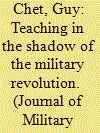|
|
|
Sort Order |
|
|
|
Items / Page
|
|
|
|
|
|
|
| Srl | Item |
| 1 |
ID:
114394


|
|
|
|
|
| Publication |
2012.
|
| Summary/Abstract |
T E Lawrence is often indicated as a model of successful interaction between Western armies and tribally organised societies - the inspiration behind the training of the AfPak Hands. But the Lawrence myth, argues Brock Millman, is a misleading one, and his contemporary, Sir Arthur Lawrance, is a better model. What is needed in countries like Afghanistan is a system of trained professionals on the blueprint of the British Colonial Service - an elite of specially selected civilian administrators with local authority.
|
|
|
|
|
|
|
|
|
|
|
|
|
|
|
|
| 2 |
ID:
133133


|
|
|
|
|
| Publication |
2014.
|
| Summary/Abstract |
In recent years, policy makers have noted that western armies in foreign lands l find themselves tasked with a new form of warfare. 'we'he novelty of twenty-f1rst Century warfare is usually traced to armies' non-combat tasks, such as civil and military engineering, economic development and security, crowd control, policing, community engagement, and public relations. Yet scholars of early modern are widely recognized these elements as central to the wars they examine, d thus not novel at all. Since specialists in the field examine armies engaged I dominantly in such non-combat activities, it is worth asking why similarities cen early modern and contemporary warfare are routinely overlooked. One _n is that despite rese-archers' increasing focus on the more mundane aspects strategy history, undergraduate classes retain the more traditional military history of battles and "Great Captains." In sections dealing with early modem ,for example, students get diplomacy, logistics, engineering, economics, social propaganda, and social control only in small doses, signifying to them that were less prevalent and less signi?cant than major battles in determining curse of wars and military affairs.
|
|
|
|
|
|
|
|
|
|
|
|
|
|
|
|
|
|
|
|
|